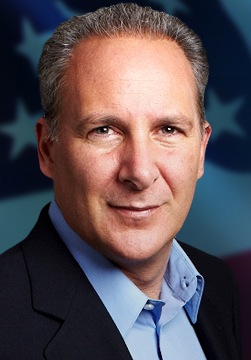Europe, There but for the Grace of Foreigners Goes America
The French "No" vote on the European Constitution, which has created political uncertainty in Europe, has produced the reflexive, and ironic "flight to quality" into the U.S. dollar. Not only has the euro fallen against the dollar, down over 2% since the vote, but to a lesser extent, initially so did every other currency on the planet, until weak economic data from Chicago's NAPM provided the catalyst for a reality check. As currency traders focus their attention on potential future problems for the European Union, they lose site of current and more acute problems confronting the United States. It is ironic that the currency of the world's biggest debtor nation is still the "safe haven" of choice when concerns arise regarding superior currencies of creditor nations.
Yes, Europe has problems, and yes the French "No" vote may create some additional uncertainty as to their ultimate resolution (though a "Yes" vote would hardly have been a panacea). The fact remains that for all its flaws, the European Union at least lives within its means, as diminished as those means may be as a result of excessive government interference in the economy in general and labor markets in particular. Currency traders unfavorably compare stagnant economic growth and high unemployment rates in Europe, with seemingly far better statistics in the United States. However, this simplistic assessment ignores two important facts:
- That favorable U.S. economic statistics measuring growth and unemployment in large part reflect the "creative" accounting methods used to calculate them, rather legitimate economic performance.
- The fact that without the massive subsidy the rest of the world bestows on the United States, a subsidy ironically increased as a result of the most recent flight to the dollar, the U.S. economy would now be in recession, with an unemployment rate even worse than that of the European Union.
Foreign subsidies, which sustain the massive U.S. current account deficit through currency intervention and the extension of low interest rates loans, allow technically insolvent American consumers to go deeper into debt to buy more imported product that they could not otherwise afford. By artificially suppressing U.S. interest rates, and recklessly extending credit, the world continues to breath air into American's enormous housing bubble, providing collateral for additional debt-financed consumption. Since consumer spending and housing account for the vast majority of U.S, "economic growth" and employment, without foreign support, the unstable foundation of America's bubble economy would give way.
Comparing the American economy with that of the European Union is unfair. A critical difference is that at the moment Europeans have to save while Americans don't. Or more specifically, Americans consumers are willing to act far more irresponsibly than their European counterparts, and the world's creditors are willing to look the other way. As a result, America's current GDP figures are in essence borrowed form the future, as today's higher growth rates come at the expense of lower growth rates in the future. In addition, service sector jobs are easily created as they use minimal capital, and therefore require little in the way of savings. When the dollar finally collapses, Americans will loose access to the world's savings, and be forced to live within their diminished means, just like the Europeans. Also like the Europeans, having to actually produce stuff for a change, encumbered by excessive taxation and regulation, but with the added obstacle of insufficient domestic savings, Americans will find creating jobs the old fashioned way a far more daunting task.
My advice to Americans is to take advantage of the world's short sightedness, and sell into the dollar's recent strength. By selling dollars I do not mean buying euro futures on leverage, that is a dangerous speculation, not to be confused with far more conservative foreign investing. I am suggesting selling dollars to buy high yielding, foreign equities.
May 31, 2005
Peter D. Schiff
President/Chief Global Strategist
Euro Pacific Capital, Inc.
20271 Acacia Street, #200
Newport Beach, CA 92660
Toll-free: 888-377-3722
Direct: 203-972-9300
Fax: 949-863-7100

















